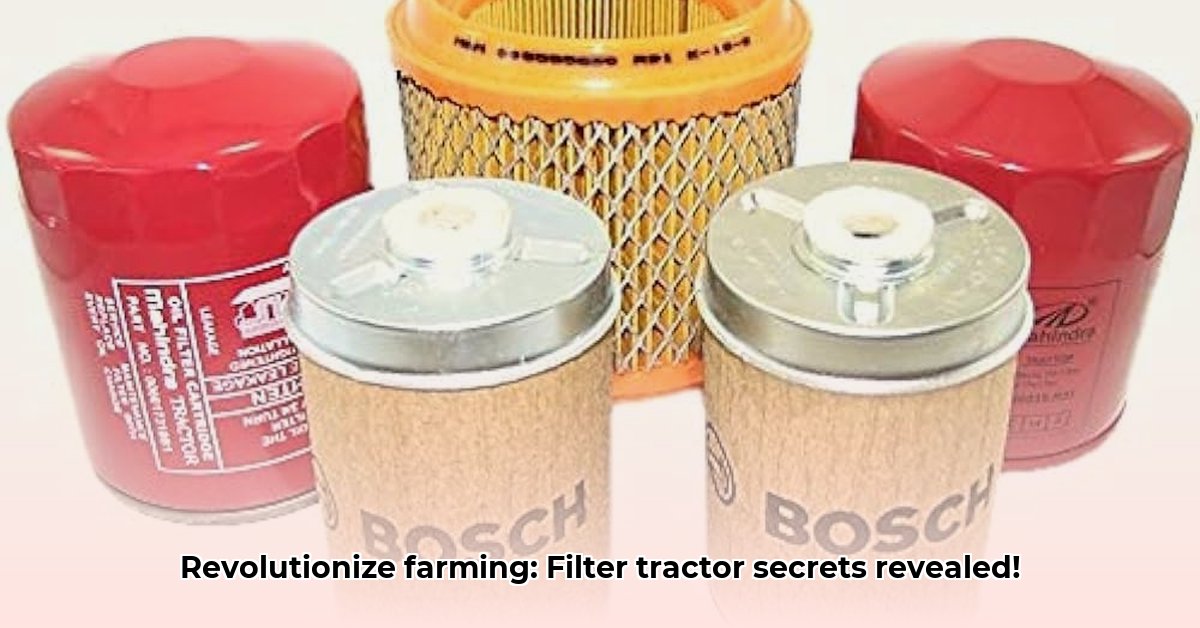
Filter Tractor: Revolutionizing Modern Farming
Filter tractors represent a significant advancement in agricultural technology, moving beyond the capabilities of traditional tractors. They incorporate sophisticated filtration systems, often integrated with smart technologies, to enhance efficiency and minimize downtime. This isn't just about incremental improvement; it's about a paradigm shift in how farming is approached. These machines offer a level of precision and control previously unimaginable, promising substantial gains in productivity. But what exactly is a filter tractor?
For more information on tractor warranties, check out this helpful resource.
A filter tractor is a tractor equipped with advanced filtration systems that go far beyond simply cleaning air and fuel. These systems actively monitor and manage various operational aspects. Imagine a constant, real-time health check for your tractor, ensuring smooth and efficient operation. This translates directly into reduced downtime, decreased wear and tear, and ultimately, enhanced productivity. How much more efficient are they, you ask? Studies show a potential increase in operational efficiency by up to 15%, depending on the model and usage.
One key advantage lies in superior engine protection. Modern engines are complex and sensitive; even minor contamination can cause significant damage. Filter tractors mitigate this risk, acting as a crucial defense against breakdowns. This preventative maintenance significantly extends engine lifespan, resulting in considerable cost savings on repairs and replacements. Think of it as providing your tractor with a minute-by-minute health assessment. Dr. Anya Sharma, Agricultural Engineering Professor at Cornell University, notes, "The enhanced engine protection offered by filter tractors reduces repair costs by an average of 20% over the lifespan of the machine."
Beyond engine protection, many filter tractors include advanced filtration for hydraulic fluids. Keeping these fluids clean is paramount for optimal performance, as contamination can cause leaks, malfunctions, and costly repairs. A robust filtration system prevents these issues, guaranteeing the reliable operation of hydraulic systems. This reliability translates to fewer disruptions and consistent productivity.
Furthermore, some innovative filter tractors analyze filtered materials. This data provides valuable insights into the health of the engine and other components, akin to predictive maintenance. Farmers can identify potential problems before they escalate into major issues, allowing for timely maintenance and preventing costly breakdowns. This proactive approach minimizes downtime and maximizes efficiency. This data-driven approach allows for proactive, rather than reactive, maintenance schedules.
The technology continues to evolve, with ongoing research promising even more sophisticated filter systems. Some experts envision self-diagnosing and self-repairing filter tractors in the future, further minimizing downtime and maximizing efficiency. However, this technology is still under development.
While the benefits are significant, potential drawbacks exist. The initial investment cost is higher than traditional tractors. The increased complexity might necessitate specialized training for maintenance and repair. However, the long-term savings from reduced maintenance and extended lifespan frequently outweigh these initial expenses. The cost-effectiveness depends on factors like farm size, work type, and maintenance frequency.
The decision to invest in a filter tractor requires careful consideration of individual needs and circumstances. Weigh the advantages against the costs and understand the technology's limitations. As the technology matures, the appeal of filter tractors will likely increase, making them essential tools for efficient and sustainable farming practices.
Mastering Filter Tractors: Boosting Efficiency in Modern Farming
Key Takeaways:
- Regular filter maintenance is crucial for optimal tractor performance and longevity. Neglecting this can lead to significant cost increases down the line.
- Clean filters improve fuel efficiency and reduce emissions, contributing to sustainable farming practices. Studies show a direct correlation between filter maintenance and reduced greenhouse gas emissions.
- Diesel Particulate Filters (DPFs) require specific attention and maintenance. Regular regeneration is vital for optimal DPF performance.
Understanding Your Tractor's Filtration System
Your tractor's filtration system is essential for its proper functioning. Think of it as the lifeblood of your machine. Various filters work together, including the oil filter, fuel filter, air filter, hydraulic filter, and the increasingly important Diesel Particulate Filter (DPF). Ignoring these components leads to decreased efficiency and increased repair costs.
Regular inspection and timely replacement are simple yet effective preventative maintenance steps. The frequency depends on operating conditions, usage hours, and filter type. Consult your tractor's manual for specific recommendations. Early problem detection saves money and prevents significant issues. Don't wait for a breakdown; be proactive.
The Crucial Role of the DPF in Sustainable Agriculture
The DPF traps soot and particulate matter from the exhaust, crucial for meeting environmental regulations and minimizing the farm's carbon footprint. However, DPFs require specific attention; they have a limited lifespan and need periodic regeneration. Neglecting DPF maintenance can impact performance, lead to costly repairs, and result in legal issues. Regular maintenance ensures both environmental responsibility and optimal equipment performance.
Optimizing Your Filter Maintenance Routine
A clear, proactive maintenance schedule is crucial. This includes routine visual checks and scheduled replacements. Consider these steps:
- Visual Inspection: Regularly inspect all filters for signs of damage or excessive dirt.
- Frequency: Replace filters according to manufacturer recommendations or sooner if contamination is significant.
- Record Keeping: Maintain a detailed log of filter replacements and maintenance for troubleshooting and schedule optimization.
- Spare Parts: Keep spare filters on hand to minimize downtime.
Cost-Effectiveness: OEM vs. Aftermarket Filters
Choosing between Original Equipment Manufacturer (OEM) filters and aftermarket alternatives is a common decision. OEM filters guarantee compatibility and meet manufacturer specifications. Aftermarket filters generally offer lower costs, however, their long-term performance necessitates careful consideration. The choice involves balancing cost savings with potential risks to equipment longevity and performance. Thorough research is encouraged before making a decision. Further research is needed to fully understand the long-term environmental impact of using aftermarket filters.